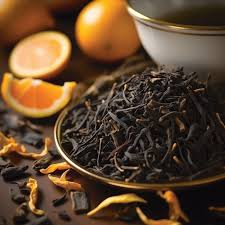
Table of Contents
Earl Grey tea is a timeless classic beloved for its distinct flavor, aromatic profile, and potential health benefits. But one common question arises among tea enthusiasts: Does Earl Grey tea have caffeine? This comprehensive guide explores everything you need to know about the caffeine content in Earl Grey tea, its variations, and its effects on the body.
Understanding Earl Grey Tea
Earl Grey tea is a blend of black tea infused with bergamot oil, a citrus fruit that gives it its unique flavor and aroma. Traditionally made with black tea, modern variations include green tea, white tea, and even caffeine-free herbal versions. Each type has a different caffeine level, influenced by its base tea.
Caffeine Content in Traditional Earl Grey Tea
The caffeine in Earl Grey tea primarily comes from its black tea base. On average, an 8-ounce cup of black tea contains 40-70 milligrams of caffeine, depending on factors like brewing time and tea variety. Earl Grey tea generally falls within this range.
If you’re sensitive to caffeine but still want to enjoy Earl Grey, you can reduce the caffeine content by steeping the tea for a shorter time or opting for a decaffeinated version.
How Different Variations Affect Caffeine Levels
- Black Tea-Based Earl Grey
As the most common type, black tea-based Earl Grey has the highest caffeine content, suitable for those looking for a morning energy boost. - Green Tea-Based Earl Grey
Green tea Earl Grey offers a milder caffeine kick, typically around 20-45 milligrams per 8-ounce cup, making it a good choice for afternoon tea. - White Tea-Based Earl Grey
This version contains the least caffeine among traditional tea bases, with 15-30 milligrams per cup, and is ideal for those seeking a gentler option. - Caffeine-Free Herbal Earl Grey
Made from rooibos or other herbal bases, these blends are entirely caffeine-free, perfect for evening tea rituals or for people avoiding caffeine altogether.
Caffeine vs. Decaffeinated Earl Grey Tea
While decaffeinated Earl Grey tea is not completely caffeine-free, it contains significantly less caffeine—around 2-5 milligrams per cup. The decaffeination process removes most caffeine, leaving just enough to retain some of the tea’s natural taste.
Benefits of Caffeine in Earl Grey Tea
Moderate caffeine consumption can provide several benefits, including:
- Increased Alertness: Caffeine is a natural stimulant that helps improve focus and energy.
- Boosted Metabolism: Caffeine may help enhance fat oxidation and metabolism.
- Improved Mood: It can promote a sense of well-being by increasing dopamine levels.
However, those sensitive to caffeine should consume it in moderation or explore caffeine-free alternatives.
Tips for Managing Caffeine Intake
- Opt for Decaf: Choose decaffeinated Earl Grey if you’re avoiding caffeine.
- Mind the Brewing Time: Steeping for less time reduces caffeine levels.
- Limit Consumption: Stick to 1-2 cups daily if caffeine sensitivity is a concern.
Conclusion
So, does Earl Grey tea have caffeine? Yes, the traditional black tea version contains caffeine, but the amount varies depending on its base tea and brewing method. Whether you enjoy a bold black tea Earl Grey or prefer a caffeine-free herbal blend, there’s a version for every taste and lifestyle. By understanding the caffeine content and making mindful choices, you can savor the elegance of Earl Grey tea without compromise.
